In 2025, more businesses in the USA are trying to choose the best way to grow online. The internet is full of tools and strategies. But one big question is: Which is better, affiliate or digital marketing? This comprehensive guide will help you understand both. We’ll cover all the basics, show you the differences, and help you pick the best online marketing strategy for your goals.
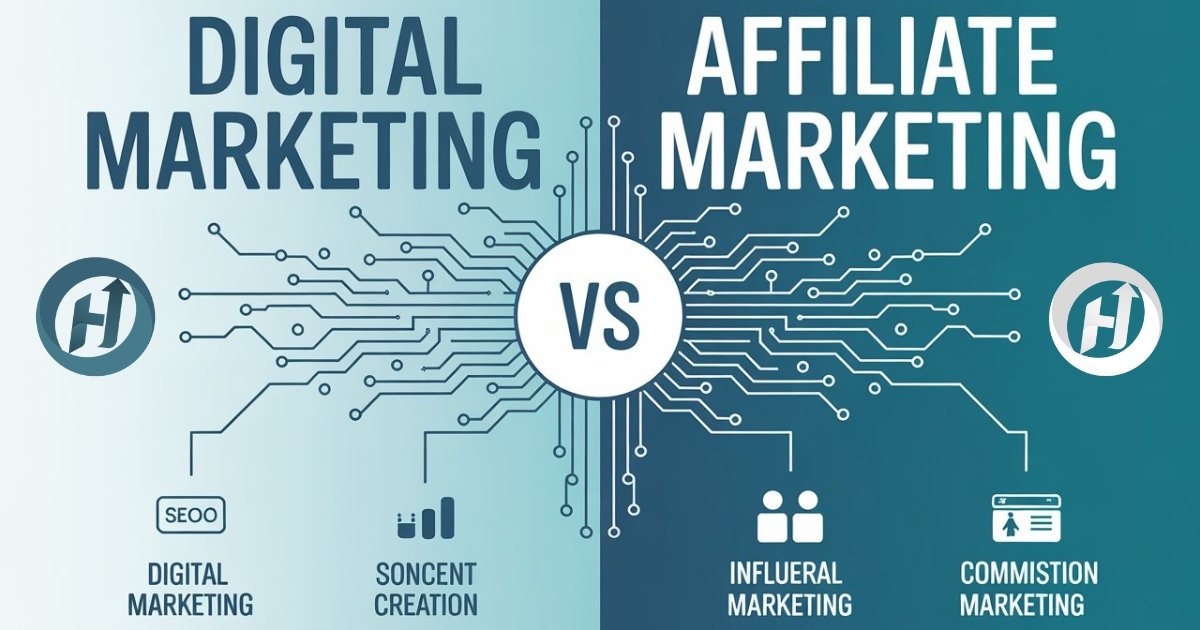
Introduction to Digital Marketing and Affiliate Marketing
In today’s fast-moving digital world, businesses are constantly searching for the best ways to promote their products and grow online. Two powerful strategies often compared are Digital Marketing vs Affiliate Marketing. While both help increase brand visibility and attract customers, they work in very different ways. Digital marketing focuses on directly reaching a target audience through tools like SEO, social media, and email.
On the other hand, affiliate marketing is a performance-based marketing model where third parties promote products for a commission. Understanding the strengths, limitations, and goals of each strategy can help you choose the best online marketing strategy for your business in 2025 and beyond.
What is Digital Marketing?
What is digital marketing? It is a way to reach people through the internet using different marketing channels. These include SEO, social media marketing, email marketing, and PPC advertising. It helps businesses connect directly with their target audience and improve sales conversion.
Digital marketers focus on online promotion, content creation, and building digital branding. The goal is to increase website traffic, attract more customers, and grow their online reputation. For someone with a digital marketing diploma, this field offers endless chances to shape a company’s success.
Key Components of Digital Marketing
To understand digital marketing, you need to know its key parts. These include:
| Component | Purpose |
| SEO | Improve visibility on search engines. |
| Content Marketing | Create helpful content for customer engagement. |
| Social Media Marketing | Use social media platforms to connect with users. |
| Email Marketing | Run an email marketing strategy to turn leads into buyers. |
| PPC Advertising | Drive fast traffic using pay-per-click advertising (PPC). |
All these tools help brands meet their marketing objectives and track their return on investment (ROI). This is why it’s often seen as the best online marketing strategy for small businesses.
What is Affiliate Marketing?
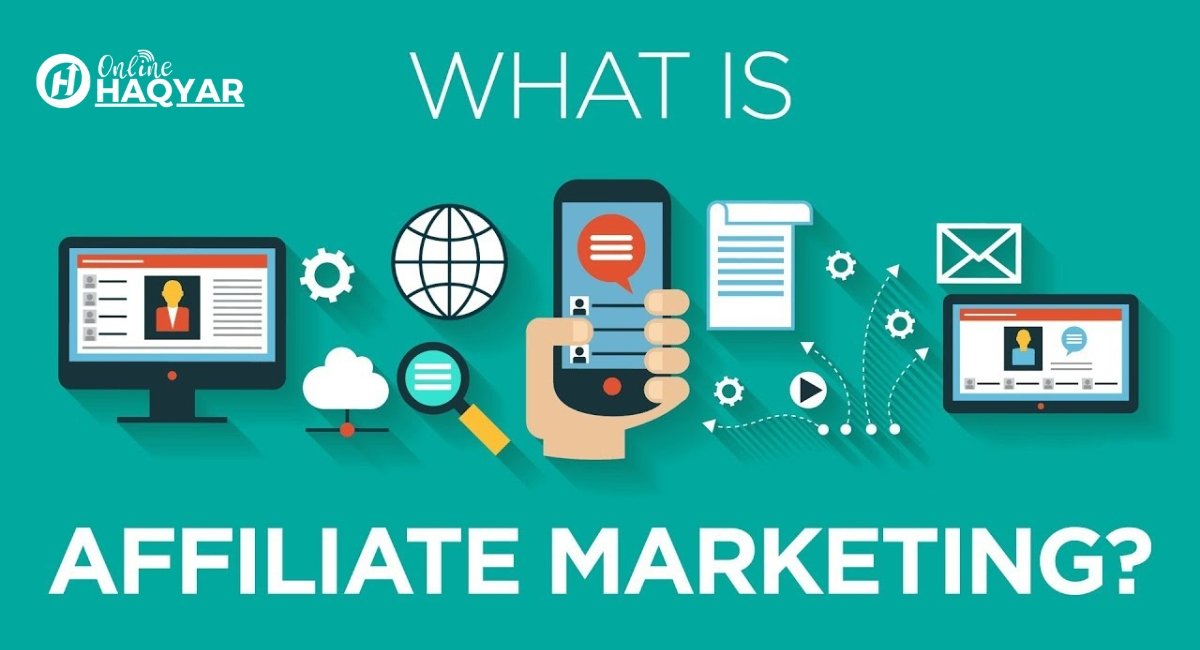
What is affiliate marketing? It is when a business works with another person (called an affiliate) to sell its products. The business gives the affiliate a link or code. When someone buys through that, the affiliate earns a commission.
This method is a great example of revenue sharing. The more the affiliate sells, the more they earn. It’s used widely in influencer marketing, blogs, and review sites. It is one of the most cost-effective marketing options out there, especially for those with limited budgets.
Main Components of Affiliate Marketing
Understanding how does affiliate marketing work means looking at its parts:
| Component | Role in the Strategy |
| Merchant | The brand or business selling the product. |
| Affiliate | The person promoting the product. |
| Consumer | The person who clicks and buys. |
| Platform | The system that tracks referral links, tracking cookies, and payouts. |
Together, they build a working affiliate program. Success depends on clear rules, fair commission-based promotions, and strong affiliate partnerships.
Types of Affiliate Marketing Explained
There are different kinds of affiliate marketing. These include:
| Type | Details |
| Unattached Affiliate | Promotes products they don’t use. Low trust but easy to scale. |
| Related Affiliate | Promotes products in their niche. Offers more relevance. |
| Involved Affiliate | Promotes products they use. High trust and high conversion rates. |
These types show how consumer behavior and product knowledge affect success. Each has a different level of effort and reward. You should choose based on your marketing execution plan.
Digital Marketing vs Affiliate Marketing: Core Differences
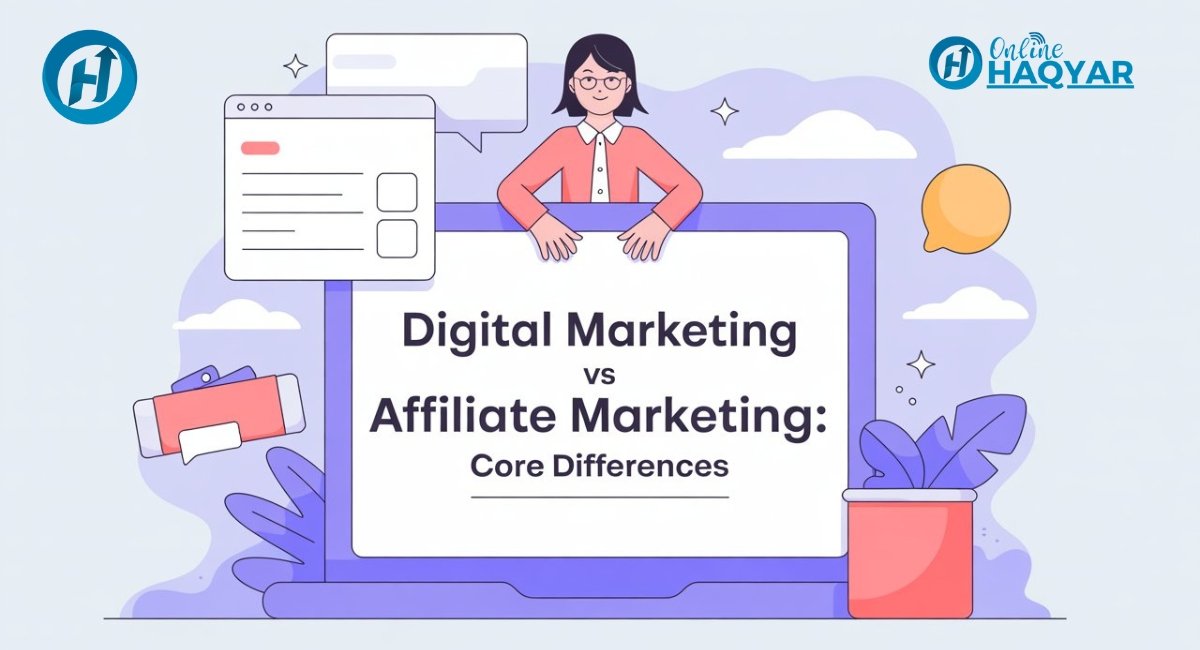
The scope and approach of marketing strategies between these two are quite different. Digital marketing covers everything: branding, lead capture, content, and ads. Affiliate marketing focuses just on sales, using partners to bring in buyers.
Another big difference is control and execution differences. With digital marketing, the business handles all the content and strategy. With affiliate marketing, you give some of that control to your affiliates. They create their own content and bring in their audience, which might not always match your brand tone.
Pros and Cons of Digital Marketing
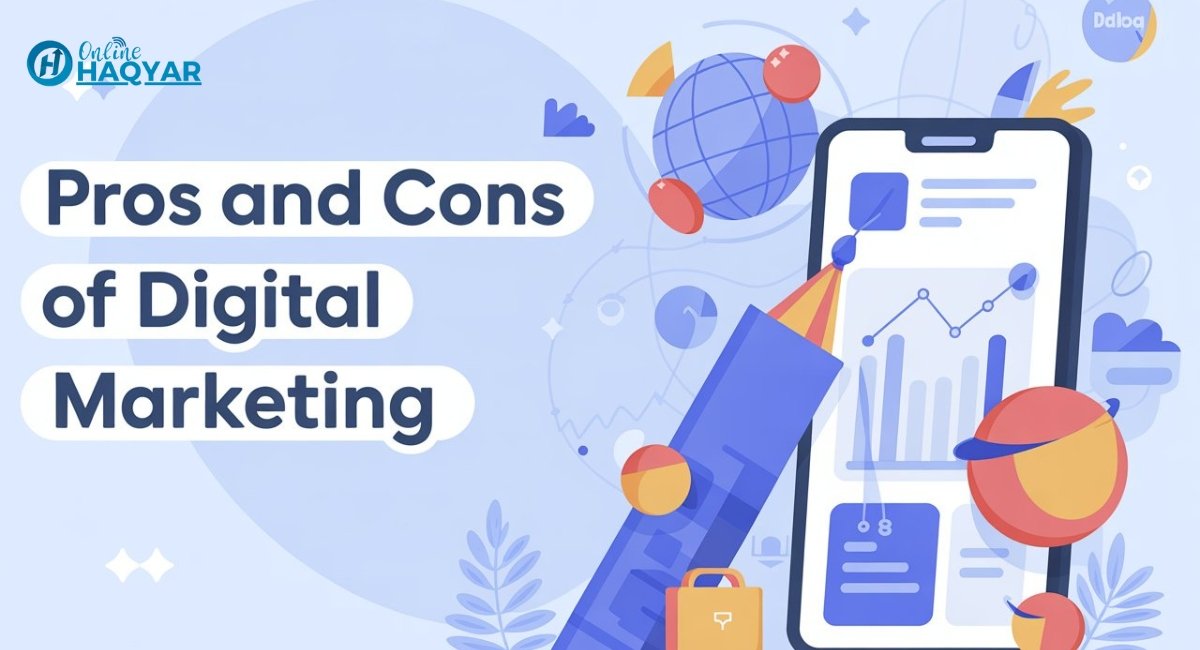
Understanding the pros and cons of digital marketing helps in decision-making. One big benefit is global reach. You can show your products to people across the world. You also gain deep insight through data tools, making target audience analysis easy.
But it’s not all smooth. It takes time, money, and a team. You need to manage many parts at once. Without good skills or help, your marketing budget allocation can go to waste. Still, if done well, it brings great results and strong online presence.
Pros and Cons of Affiliate Marketing
The pros and cons of affiliate marketing are different. It is cheap to start. Since you pay only for results, there’s no big cost at the beginning. It helps you get into new markets fast through affiliate marketing strategies and commission-based sales.
However, you lose some control over marketing channels. Not all affiliates care about your brand. That can lead to problems. Also, if affiliates stop working, your traffic drops. This is why tracking, management, and smart affiliate partnerships matter a lot.
Affiliate Marketing vs Digital Marketing: Earning Potential
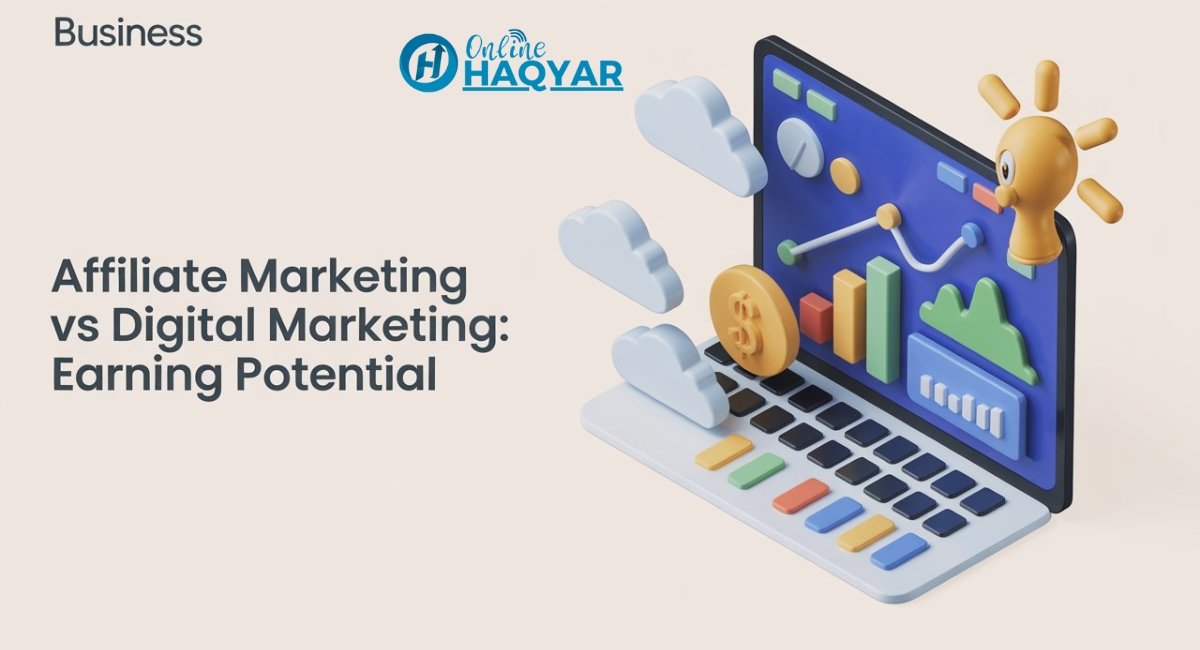
When thinking about income, both can earn well. But they work differently. In affiliate marketing, you earn through passive income. You do the work once and get paid every time a sale happens.
Digital marketing needs more daily work. But it brings more control and bigger returns in the long run. Here’s a quick look:
| Type | Earning Style | Example Monthly Income |
| Affiliate | Passive, sales-based | $500 – $10,000+ |
| Digital | Active, campaign-based | $2,000 – $20,000+ |
Your marketing strategies for startups might focus more on affiliate income early on. But both can grow big if done right.
Essential Skills for Digital Marketing vs Affiliate Marketing
To succeed, you need the right skills. For digital marketing, learn SEO, video content marketing, voice search optimization, and analytics. Knowing how to use digital tools and run ads helps too.
For affiliate work, skills in writing, audience research, and trust-building are key. You also need to understand how to engage a target audience and what makes people click and buy. In both fields, knowing marketing objectives is a must.
Getting Started with Digital Marketing: Step-by-Step Guide
Start by choosing your niche. Build a website. Then plan your content marketing strategy. Use SEO (search engine optimization) to make sure your content is found. Then use email marketing and ads to keep traffic coming in.
Track results with tools like Google Analytics. Focus on improving your lead generation over time. Learn from others, join groups, and if possible, get a digital marketing diploma to deepen your skills.
Getting Started with Affiliate Marketing: Step-by-Step Guide
Choose a product category you care about. Find an affiliate program that matches. Sign up and get your referral links. Create content like blogs, videos, or social posts. Use social media marketing and email to bring people to your links.
Be honest in reviews. Build trust. Use tools to see which products get the most clicks. Learn how to create an affiliate program if you want to run one someday.
Future Trends in Digital Marketing and Affiliate Marketing (2025+)

Emerging trends in digital marketing 2025 include smarter use of artificial intelligence in marketing, real-time chatbots, and more use of video. Brands are also focusing on voice search optimization as people use voice commands more often.
For affiliate marketing, micro-influencers are becoming more popular. People trust smaller creators with niche audiences. Tools for better tracking cookies, fraud control, and advanced stats are also growing. Both methods are growing fast and getting smarter.
Choosing the Right Marketing Path: Key Factors to Consider
Should I choose affiliate or digital marketing for my business? The answer depends on your goals. If you want full control and long-term growth, digital marketing is the way. If you want fast, low-cost results, affiliate marketing works well.
Think about your time, skills, and budget. Also, consider your target audience analysis. Some businesses even use both together. That way, they get the best of both worlds.
Digital Marketing vs Affiliate Marketing: Final Verdict & Recommendation

So, who wins in Digital Marketing vs Affiliate Marketing: Comprehensive Guide (2025)? The truth is, both can win. They just fit different goals. Affiliate marketing is cost-effective, while digital marketing gives more control.
If you’re just starting, affiliate marketing is a great first step. If you’re ready for more, build your digital branding through your own site and channels. Either way, you’re building something big. And that’s the real goal—business success through marketing.
Conclusion
Choosing between Digital Marketing vs Affiliate Marketing in 2025 depends on your business vision, goals, and resources. Both are powerful in their own right—digital marketing builds long-term brand visibility and strengthens customer engagement, while affiliate marketing offers a scalable, cost-effective marketing model based on performance-based promotions. Whether you’re aiming for direct control or prefer leveraging affiliate partnerships, understanding the full picture helps you make smarter decisions. As the digital world continues to evolve with voice search optimization and artificial intelligence in marketing, your strategy must be flexible. Use this guide to match the right method with your goals and maximize your online marketing strategy.
FAQs
Which is better, affiliate marketing or digital marketing?
It depends on your goals—affiliate marketing is great for passive income, while digital marketing offers more control and long-term brand growth.
Can you make $100 a day with affiliate marketing?
Yes, with the right niche, traffic source, and affiliate marketing strategies, many affiliates consistently earn $100 or more daily.
Who earns more, digital marketer or affiliate marketer?
Earnings vary, but skilled affiliate marketers can out-earn salaried digital marketers, especially with high-traffic platforms and strong conversions.
Is there a downside to affiliate marketing?
Yes, you have less control over marketing channels, and income depends heavily on traffic, product demand, and affiliate terms.
What is the highest paying affiliate marketing platform?
Platforms like CJ Affiliate, ClickBank, and Impact Radius are known for high-paying offers, especially in finance, SaaS, and health niches.


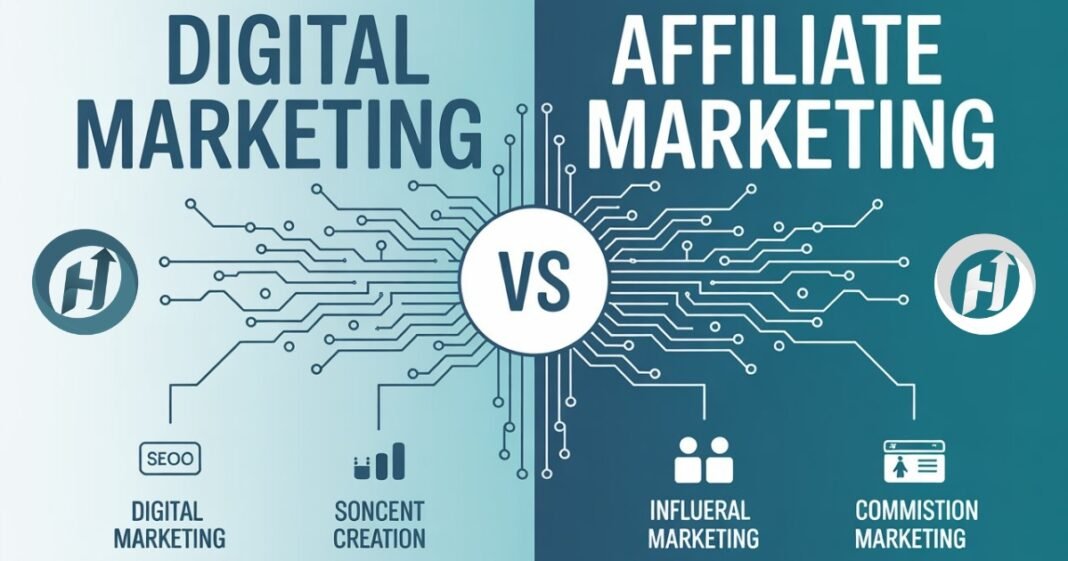

thgzqa
This guide provides a clear comparison between affiliate and digital marketing, which is essential for businesses aiming to grow online in 2025. It highlights the unique strengths of each strategy, helping businesses make informed decisions. The focus on tools like SEO, social media, and email marketing in digital marketing is particularly useful. Affiliate marketing’s performance-based model is also explained well, offering a different approach to online growth. How can businesses effectively balance both strategies to maximize their online presence? Given the growing economic instability due to the events in the Middle East, many businesses are looking for guaranteed fast and secure payment solutions. Recently, I came across LiberSave (LS) — they promise instant bank transfers with no chargebacks or card verification. It says integration takes 5 minutes and is already being tested in Israel and the UAE. Has anyone actually checked how this works in crisis conditions?
Пошаговая инструкция по получению разрешения на работу, для соискателей, обязательно нужно знать.
Работа за границей: что нужно знать о разрешении, подробный гайд.
Разрешение на работу: основные требования, что нужно учитывать.
Что делать, если истекает разрешение на работу, полезные советы.
Разрешение на работу для студентов, условия для трудоустройства.
Как избежать ошибок при получении разрешения на работу, полезная информация.
Как получить разрешение на работу за границей: международный опыт, особенности.
Документы для получения разрешения на работу, требуемые документы.
Как избежать отказа в разрешении на работу, полезные рекомендации.
Что нужно знать о своих правах при получении разрешения на работу, основные моменты.
Как долго ждать разрешение на работу, что нужно знать.
Разрешение на работу для фрилансеров, полезные советы.
Где узнать о готовности разрешения на работу, пошаговая инструкция.
Как получить разрешение на работу родителям-одиночкам, рекомендации.
Советы по интервью для разрешения на работу, все нюансы.
Налогообложение для работников с разрешением, важные аспекты.
Как получить разрешение на работу инвалидам, лучшие практики.
Оплата услуг по получению разрешения на работу, важная информация.
Как переехать за границу с разрешением на работу, планирование.
Как получить разрешение на работу в условиях кризиса, важные советы.
оформление разрешения на работу [url=http://www.oformleniernr.ru/#оформление-разрешения-на-работу]http://www.oformleniernr.ru/[/url] .
Bạn có thể chơi cùng lúc nhiều slot khác nhau trên xn88 app com nhờ tính năng đa tab. Đây là lợi thế lớn cho những ai muốn đa dạng hóa chiến lược và tăng cơ hội trúng thưởng. TONY12-30
Hệ thống phân cấp hội viên tại xn88 là gì mang lại lộ trình thăng tiến rõ rệt với những ưu đãi độc quyền, chỉ dành riêng cho những nhà đầu tư chiến lược. (Tương tự cho đến đoạn 60, tập trung vào: Sự tận tâm, quyền lợi khách hàng, tính chuyên nghiệp) TONY12-30
skjJJTIJbTIRjFvlVTKL
Bạn có thể đặt giới hạn cược/ngày tại https www 888slot com login – chơi có trách nhiệm, vui vẻ lâu dài. TONY01-12
888SLOT thường xuyên cập nhật phiên bản mobile app với giao diện mới, tính năng nâng cao và sửa lỗi nhanh chóng – luôn mang đến trải nghiệm tốt nhất cho người dùng di động. TONY01-12
Bạn có thể xem demo video hướng dẫn chơi từng slot tại 188v rút tiền – học nhanh, chơi chuẩn, thắng dễ. TONY01-26